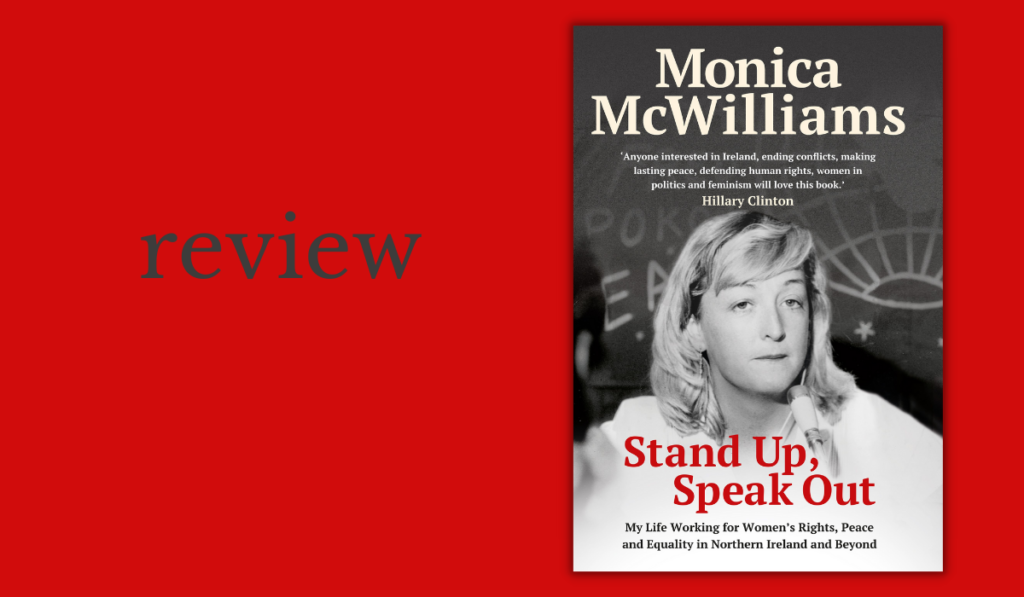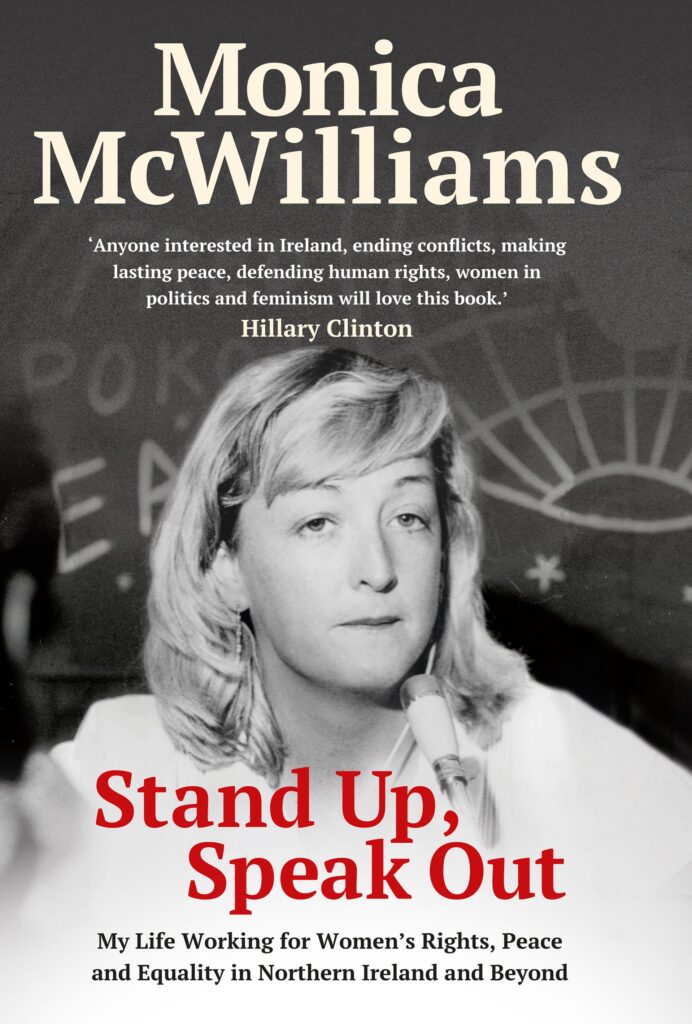
Stand Up, Speak Out: My Life Working for Women’s Rights, Peace and Equality in Northern Ireland and Beyond|Monica McWilliams|The Blackstaff Press|ISBN: 978-1-78073-322-7|£19.99
“A heady mixture of memoir, social science treatise and political manifesto”
—John Kirkaldy on Stand Up, Speak Out, by Monica McWilliams
by John Kirkaldy
Monica McWilliams grew up in Kilrea, County Derry in a dairy farming family.
There are a couple of early nice asides. Her cousin, Charlie Haughey, gets a brief mention and so too does one of her first boyfriends, Liam Neeson (‘we went out for a few months and had a great time together’).
Education and career
Her family believed in education and McWilliams’ CV is a long and distinguished one.
Graduating from the Queen’s University, Belfast and the University of Michigan, she has been an academic, human rights activist and an elected member of the Northern Irish Legislative Assembly, 1998-2003.
She has been a strong campaigner all her life for feminist causes.
In 1996, she co-founded the Northern Irish Women’s Coalition (NIWC) political party and was elected as a delegate to the Multi-Party Peace Negotiations, which led to the Good Friday Peace Agreement in 1998.
She chaired the Implementation Committee on Human Rights on behalf of the British and Irish Governments. She was appointed Chief Commissioner of the Northern Ireland Human Rights Commission, 2005-2011, and was the Oversight Commissioner for prison reform 2011-2015. She sits on the Independent Reporting Commission for the disbandment of paramilitary organisations in Northern Ireland.
Civil Rights Movement
The Civil Rights movement in Northern Ireland, which started in 1968, engaged her early interest. The book has graphic accounts of growing up in a divided society and there are many descriptions of the escalating violence.
Her friend, Mickey Mallon, for example, was to have sat next to her in a Queen’s exam. His place was empty; he had just been murdered by the UDA.
Women’s Movement
However, it was the Women’s Movement that was increasingly to dominate McWilliams’ life from the late 1970s onwards.
In 1978, she was appointed to a lectureship in Social Policy at the Ulster Polytechnic. She became active in a number of organisations, the Poverty Lobby, Gingerbread (a group for single parents), the Northern Ireland Women Right’s Movement and the Northern Ireland Committee of the Irish Congress of Trades Unions (ICTU).
All of these were focussed on what she called the 4 Cs for women – culture, cash, childcare and confidence.
She pioneered courses for women at degree and postgraduate levels. Her energy and commitment are stamped on every page.
Childcare
McWilliams found managing both family life (she is the mother of two children) and a career daunting. Her reaction echoed the experience of so many women; ‘being a mother and a worker was tough, even with a very supportive partner’.
‘childcare suddenly became our biggest outgoing; being able to remain in paid work depended on it’.
Her two children, Gavin and Rowen, got used to campaigning, starting with sleeping in cots at meetings. Rowen, aged seven, when put in charge of the loud hailer at an election, urged voters, ‘Vote for my Mum. She keeps her promises’ and then often added disarmingly, ‘Don’t you, Mum?’

Domestic Violence
Domestic violence and rape have always been key issues for McWilliams. She has co-authored two books and three government-published studies on the subjects.
Her research produced many sickening examples. ‘I heard about ruptured eardrums, fractured ribs, gouged eyes and broken bones. One man had taken the time to put on his steel-toe boots before assaulting his pregnant wife.’
Women reporting such incidents risked further reprisals. ‘I’ve got a big knife waiting for you – c’mon till you see what you are going to get,’ one complainant was told. There was an additional complication. ‘In this area, you don’t go to the police.’
The Good Friday Agreement
For many, the part played by McWilliams in the signing of the Good Friday Agreement and its aftermath will be the most interesting part of the book. In 1996, she founded with Pearl Sagar, a Protestant social worker, the NIWC and they won two seats in the multi-party talks that led to the signing.
Their crude – but very effective – election poster with the slogan, ‘Wave Goodbye Dinosaurs’, highlighted their campaign as the only elected women.
She provides in great detail the tortuous process that eventually led to the ratification of the Agreement by an all-Ireland referendum in May 1998.
Male egos, entrenched positions, the rise and fall of violence (coupled with a brittle ceasefire), some walk outs, contentious issues at every twist and turn (even down to whether it was acceptable for a meeting’s bottled water to come from the Republic) all made for a tortuous journey. It often appeared a case of one step forward, three steps backwards.
Election
The two women seemed to play a commendable role of aggressive common sense. In so doing, they often faced a barrage of misogynistic comment from nearly all sides.
Ian Paisley Jnr, for example, delighted in chanting, ‘Moo, Moo’, when McWilliams was speaking.
She was elected in 1998, along with Jane Morrice, to the Legislative Assembly, holding her seat till 2003. Both as an elected representative and subsequently, she has campaigned for a Northern Irish Bill of Rights with little support from the British Government.
Human Touch
The book has some warm human touches: her own battle with breast cancer; the tragic suicide of her sister, Noeleen; and her close relationship with another sister, Mary.
There are many delightful descriptions of some characters she admired, such as, Mo Mowlam, the unconventional but highly effective Northern Irish Secretary, and David Ervine, one of the leaders of the Progressive Unionist Party (the PUP), at whose funeral she delivered a eulogy.
Her experiences have been put to international use, in places, such as Columbia, Costa Rica and Rwanda.
The examples of the Civil Rights movement in the United States and the ending of Apartheid in South Africa, have in turn, inspired her.
The title of the book is based on some patronising advice from an elective representative. Many, including myself, are glad that she blatantly contradicted him and continued to ‘Stand Up and Speak Out’.

John Kirkaldy has a PhD in Irish History, worked for many years with the Open University and has been reviewing for Books Ireland since 1980.
He has contributed to three Irish history anthologies, a school textbook, and has been involved in a number of Open University History documentary series. Aged 70, two years ago, he went round the world on a much delayed gap year described in his book, I’ve Got a Metal Knee: a 70-Year Old’s Gap Year.











